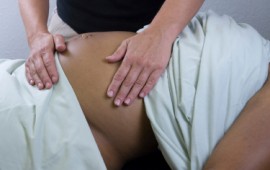Do I Get a Maternity Massage? What are the Risks and Benefits?
Author: Shannon Miller Lifestyle

Pregnancy can hurt!
- Balance is off.
- Hormones are different and changing constantly.
- The whole Skeletal System is under a different kind of strain.
All of these symptoms of pregnancy can cause changes in posture, pressure on joints, weaknesses in various opposing muscle groups, stress, and pain.
Can pregnancy massage help? Or can pregnancy massage hurt?
Helpful pregnancy massage:
Over the last ten years, a lot of research has gone in to beneficial massage for pregnant women. The American Pregnancy Association (APA), states that massage can help a pregnant woman with:
- Hormones regulation: helps dopamine and seratonin, which can reduce depression
- Swelling: helps reduce swelling and flush fluids
- Nerve pain: helps diminish back and joint pain.
These are not just simple symptoms of pregnancy. They can feel debilitating. A massage, in that case, can help a woman get through a very tough time. We asked Joanna from In Motion Physical Therapy if prenatal massage was offered at her practice, and of course, it was. So, look for massage therapists in highly-trained atmospheres such as this or at your doctor’s office.
Types of Helpful Pregnancy Massage:
- Legs: Pregnant women carry excess fluid in their legs and ankles. A leg massage can press some of that away and out of the body.
- Face: Pregnant women carry fluid in their faces, and also stress. A face massage can relieve pressure from the forward posture they sometimes attain later in pregnancy (when the face is pressed forward to counterbalance the tummy).
- Back: A back massage is good for hormone regulation and nerve regulation.
- Arms: An arm massage that focuses around the joints can relieve joint pain as well as press out swollen areas.
NOTE: A prenatal massage therapist should know to never put a pregnant woman on her stomach or flat on her back; always in an incline or side-lying position. In any case, the pregnant woman should insist on this.
High Risk Pregnancies and Massage:
A high-risk pregnancy, for the purpose of this article, includes but is not limited to:
- Risk of illness or death in child and/or mother
- Likelihood of complicated childbirth
- Mother is over 40 or under 15
- Mother is diabetic
- Pre-eclampsia
- Multiples
- Mother is asthmatic
- Mother has life-threatening illness
Though it may seem that women in the high risk category should steer clear of anything that seems “alternative,” in the case of massage, the opposite may be true.
In fact, the Journal of Psychosomatic Obstetrics and Gynecology reports that massage can actually decrease the riskiness in nature of such pregnancies. Helping with hormones, swelling, and nerve pain in such difficult pregnancies helps women with some of the very symptoms that make her pregnancy difficult. (Field, T. “Pregnant Women Benefit from Massage Therapy,” Journal of Psychosomatic Obstetrics and Gynecology, 20, 31-38)
